The U.S. Department of the Interior (DOI) recently cleared away one major hurdle in the path of Shell Oils plan to drill for oil in the Arctic this summer. At the same time they also swept aside objections raised by Greenpeace and many others that Arctic drilling was an invitation to climate change chaos. In the official Record of Decision affirming the legality of Shells offshore oil and gas leases, DOI stated that it was not required to analyze the amount of greenhouse gases (GHGs) emitted by burning the oil and gas that will be produced from the lease sites. In failing to do so, the government is violating the spirit and the letter of our environmental laws, and seems to be flunking Econ 101 at the same time.
The governments position is that expanding Arctic production will not increase oil consumption because it will simply displace oil produced from somewhere else. DOI quotes a court opinion that the level of oil and gas used in the United States would not likely change, one way or the other, because of oil and gas production in the Chukchi Sea. Americas desire for oil and gas, if not satisfied from American sources, will be satisfied from elsewhere (p. 9). This is a highly questionable assumption that must be backed up by firm analysis rather than just stated.
A recent paper published in the scientific journal Nature provides strong evidence to the contrary, finding that for every barrel of increased production, global oil consumption would increase 0.6 barrels owing to the incremental decrease in global oil prices. The idea here is fairly simple. An increase in the supply of oil, while holding demand constant, leads to lower oil prices and higher consumption — and hence, higher emissions of greenhouse gases.
The truly amazing thing is that DOI seems to agree with these assumptions but tries to duck responsibility for their logical conclusions. Elsewhere in the same document they brag that approving the lease sale could lead to significant increases in domestic oil and gas production and that oil prices potentially could decline (p. 17). The government simply cannot claim credit for lower oil prices while at the same time denying responsibility for the increased GHG emissions that come with it. DOI is trying to have its cake and eat it too.
DOI goes on to argue that any connection between the lease sale and downstream GHG emissions is too speculative to include in their Environmental Impact Statement (EIS). In response to this, Greenpeace submitted supplemental comments providing numerous citations to models and techniques that are already being developed and used to perform exactly the type of analysis needed here. In some instances government agencies are already analyzing how markets respond to shifting energy supplies, and are applying those lessons to environmental issues such as the Keystone XL pipeline, biofuels and others.
But in the case of Arctic leases, the DOI doubled down: After consideration of Greenpeaces comments and review of the Final Second SEIS, I have determined that the Final Second SEIS includes a thorough and logical analysis of the reasonably foreseeable impacts from oil and gas activities related to Lease Sale 193 (p. 10).
DOI doesnt want to answer this question because it exposes a contradiction at the heart of our national climate policy. President Obama has often spoken movingly about the need for serious action on climate change, and has put forth several positive policiessuch as the EPAs Clean Power Planto address greenhouse gas pollution. But at the same time he has continued to lease out public lands for coal extraction and has opened the Arctic and Atlantic outer continental shelves to oil drilling. These steps are counter-productive and threaten to undermine Obamas legacy on climate change.
It is becoming increasingly clear that we need to keep the vast majority of existing fossil fuel reserves in the ground if we are to have a chance of limiting warming to 2 degrees C. In particular, another recent study published in Nature found that 100 percent of Arctic oil is unburnable in a 2 degree C scenario.
A recent Greenpeace report — Leasing Coal, Fueling Climate Change — caught the government making the same poor economic arguments in approving the leasing of public lands for coal extraction as it has for Arctic drilling. That report found that emissions from public lands may be larger than any reductions made by the EPA, and the social costs of this dirty energy extraction will swamp any benefit to U.S. taxpayers. And far from being a minor contribution, a recent report from the Center for American Progress found that taxpayer owned public lands and offshore waters account for more than one-fifth of total U.S. greenhouse gas emissions. Coal makes up 57 percent of these public lands emissions, but offshore oil (16 percent) and gas (7 percent) play a significant role as well.
Now there may in fact be subtleties in how Arctic oil impacts the global oil market, but thats exactly why we need DOI to conduct a thorough and credible analysis. The National Environmental Policy Act (NEPA) requires government agencies to analyze the direct, indirect and cumulative impacts of any decisions. Policy makers need this information and the American public deserves to know how much GHGs are being emitted by our broken public lands leasing policies. It is vitally important that we get this right.
There is evidence that the tide is starting to turn. A federal court in Colorado has ruled that downstream emissions from a coal mine need to be accounted for under NEPA, and the White House Council on Environmental Quality released draft guidance instructing federal agencies to incorporate climate change in their EISs in a more consistent manner.
If we are to have a shot a beating global warming, we need to bring our public lands policy in line with climate change constraints. Arctic drilling is a bad idea for any number of reasons, and saying no to Shells plan would be a great first step.





